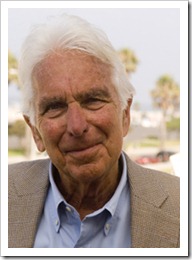Over the last year, Pocketblog has studied the work of many fine business thinkers. It is time to turn our attention to Warren Bennis.
Bennis is not just an expert on leadership – which he undoubtedly is. It was he who created the modern interest in the subject, with the book he co-wrote with Burt Nanus: ‘Leaders: The Strategies for Taking Charge’.
Bennis was greatly influenced by Douglas McGregor, who both taught and mentored him. McGregor was influential, with his Theory X and Theory Y, in examining the ways we can manage colleagues at work, and influence their motivation.
The Story of Motivation in the Workplace
… is one of shifts towards and away from a prescriptive scientific perspective. In a recent Pocketblog, I described how FW Taylor invoked ‘scientific management’ to create a repeatable process for optimising work-rates. His follower, Elton Mayo then discovered that human factors can over-ride the simplistic approach to theoretically optimised efficiency levels.
It was Douglas McGregor who characterised these two approaches as Theory X (controlling, task-focused management) and Theory Y (more democratic, relationship-driven management). McGregor argued powerfully in ‘The Human Side of the Enterprise’ and later books that Taylorism could not work sustainably in the modern world; Theory Y must dominate.
Enter Warren Bennis
Bennis followed McGregor in studying organisational development and looked to him as a mentor. McGregor to a great extent shaped Bennis’s career and we will see more about that next week.
What Bennis contributed was a focus on the work of leaders, and what leadership means in an organisational context. For all those of us who work in organisational development or leadership development, he has provided the foundations of modern thinking.
And for me, his principal contribution is the body of evidence he accumulated to show that leadership is open to everyone. It is not a product of birth, of genes, or even of the type of school you went to. It can be learned and developed like any other skill.
The Science of Leadership
There are two ways of doing science. In my own discipline of physics, you can even study it formally in these two ways: experimental and theoretical. Theoreticians dream up grand theories in response to limited experimental data, and then make predictions that experimentalists test. It is only when the data prove the theorist wrong that science truly advances. The smug feeling theoreticians get when the evidence supports their theory cannot mask the deeper knowledge that it can never constitute proof. A theory is never more than one experiment away from falsification.
Experiments, on the other hand, are glorious. They always yield knowledge. Maybe it corroborates existing knowledge – which is comforting – or maybe it challenges it, from which progress arises – which is truly exciting. Theorists know we are at the weak end of the process.
Bennis is a data gatherer. He has not presented a grand theory of leadership. Not for him: four leadership styles, six leadership roles or eight ways to lead. Bennis and Nanus started their revolution in leadership thinking by surveying 90 leaders, from business, sports, the arts and exploration.
Some Ideas
Bennis is perhaps best known for his tabulation of the differences between leaders and managers – which we mentioned a year ago. The phrase ‘managers do things right: leaders do the right thing’ has become a commonplace – even turning up with very little adaptation, in a speech by Nick Clegg over the summer.
But many other ideas that we accept as commonplace were first articulated in their modern form by Warren Bennis:
Leaders learn from failure.
Adverse circumstances and a series of failures is a more valuable learning route than early and continued success.
Leaders create empathy
Leaders must bring people alongside their own views and they can only do this by empathising with their followers.
Leaders create great groups
Bennis and Nanus argued that great results emanate from great groups and it is the role of a leader to bring them together and and create the opportunities for them to thrive.
So here is the deal
Leadership can be learned and it was Warren Bennis who did more than any other thinker to put these ideas to us.
More in Part 2, next week.
Some Management Pocketbooks you might enjoy
The Leadership Pocketbook
As you would expect, a lot of Bennis’s ideas suffuse this volume.
The Management Models Pocketbook
Looks at models of leadership that are often informed by Bennis’s thinking.
The Emotional Intelligence Pocketbook
Bennis has often stressed emotional intelligence as a vital leadership skill.
The Empowerment Pocketbook
Empowerment is what a leader should be about.
The Self Managed Development Pocketbook, and
The Learner’s Pocketbook
Bennis argued that leaders need to be learners.

